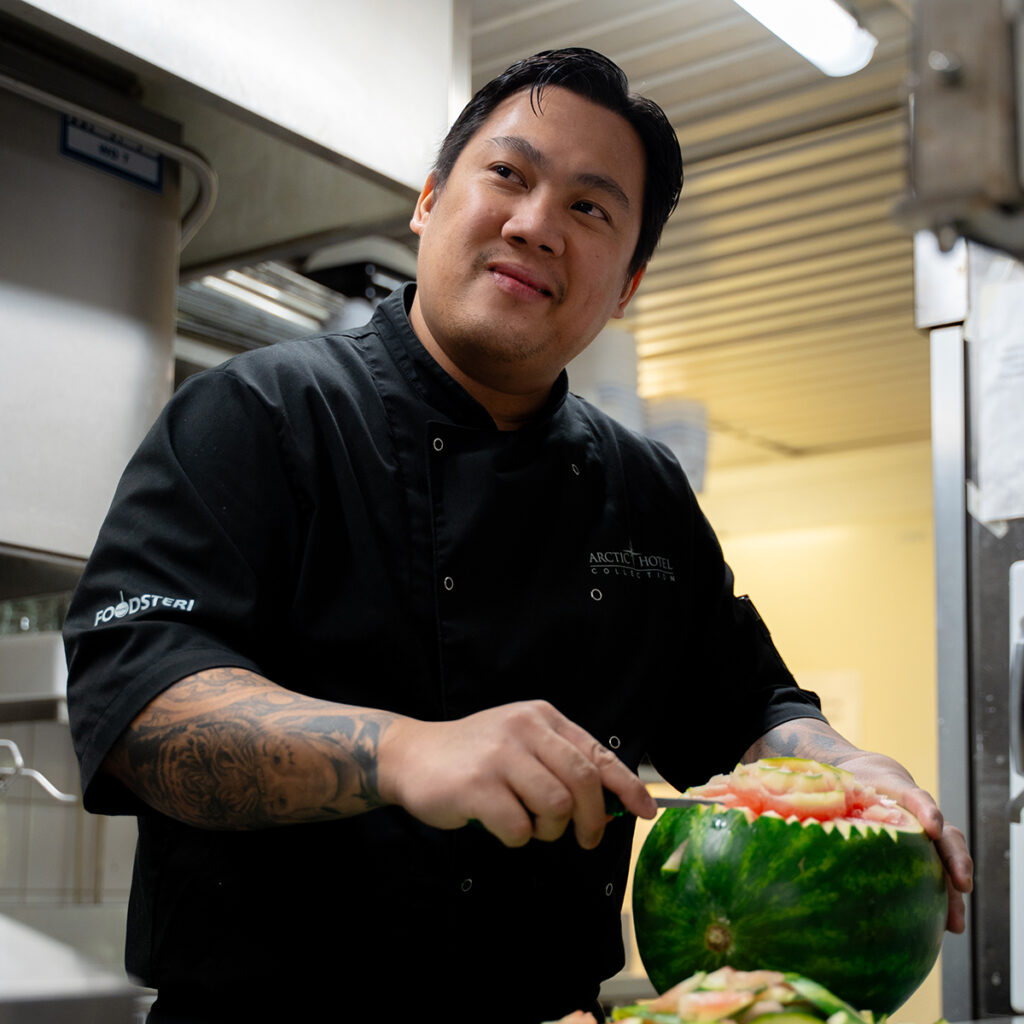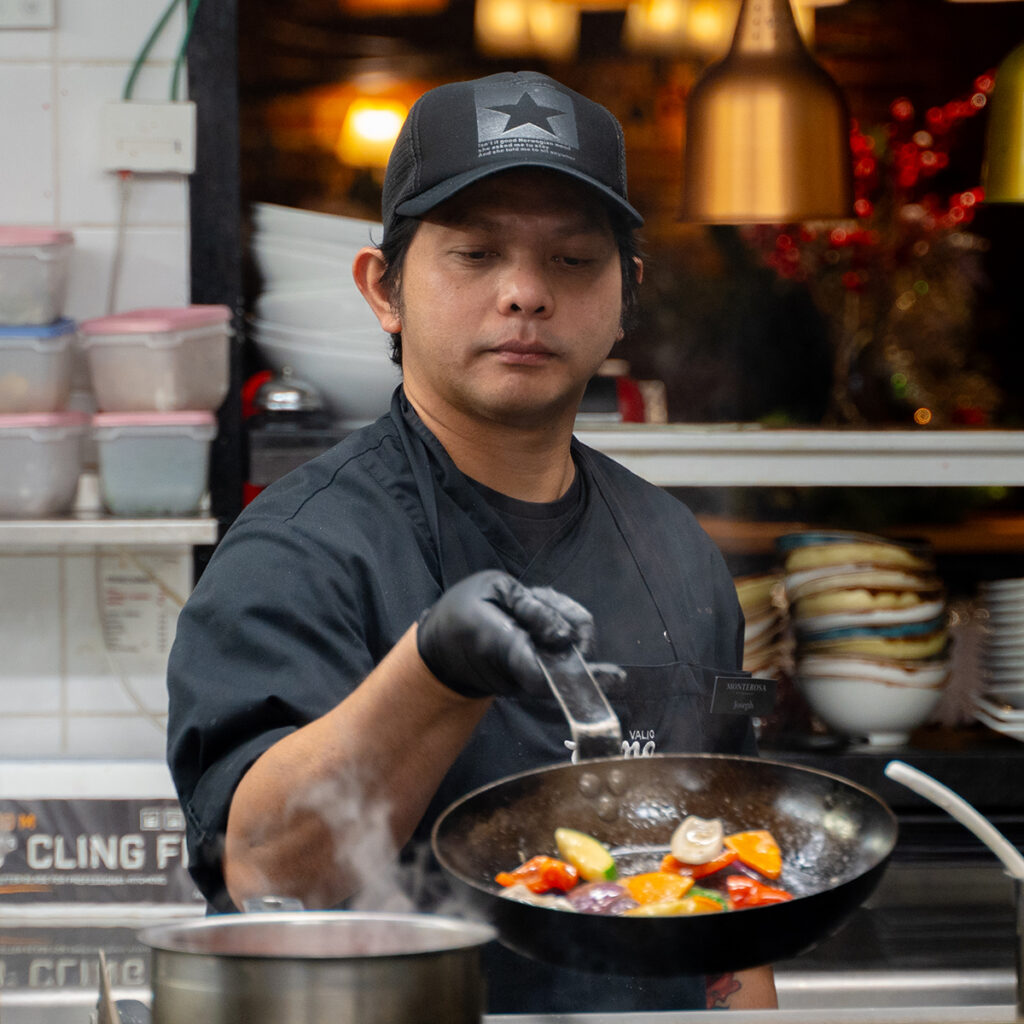Lapland calls for international professionals
During the winter season, Lapland’s tourist destinations are characterised by an international atmosphere, both among customers and staff. Professionals recruited from abroad by Eezy help to maintain a high level of service in the hotels and restaurants of a family-owned company in Rovaniemi.
Filipino chefs Emil Malunao and Joseph Plaza arrived in Rovaniemi last September as seasonal employees at the hotel and restaurant chain Arctic Hotel Collection for the winter season 2023–24. Malunao prepares spectacular breakfast buffet items, and Plaza’s specialities are à la carte dishes and American-style barbecue. Both are used to travelling as part of their jobs: Malunao previously worked in Poland, and Plaza’s previous job was in the United Arab Emirates.
In Finland, they have a permanent employment relationship with Eezy. The work may continue in Rovaniemi even after the winter season. It is also possible to relocate to Southern Finland for the summer season.
Malunao and Plaza feel they have been well received and accepted as part of the work community. They describe the atmosphere of the workplace as pleasant and respectful. The working language is English. Living in an Arctic environment is a new experience for both of them.
“I have had a great time in Rovaniemi, although it is much colder here than in any other place I have been before,” Emil says.
Joseph admits that adapting to the professional Finnish kitchen culture has required him to take a new approach to cooking.
“In Finland, the use of spices is more restrained. I am used to frying steaks until they are well done, but medium is the preferred level here.” In their spare time, the men prepare traditional Filipino food. Over the years, Rovaniemi has also developed its own Filipino community with, for example, frequent basketball games.

Exemplary work
Arctic Light Hotel’s Chef Petri Selander has only good things to say about their international employees.
“They are very diligent and motivated. Their attitude towards the work is great.”
Foreign employees usually require a little more guidance and examples from their supervisors. According to Selander, the biggest difference between different food cultures is the seasoning, and reindeer meat is a sensitive ingredient in this regard.
“We must remember that we are now in Finland, and that we want to serve reindeer in the usual fashion. Food is culture and tells us who we are,” says Selander, who is also the Chairman of Lapin Keittiömestarit ry and the Vice-Chairman of the Finnish Chef Association.
Arctic Hotel Collection consists of two family-owned hotels and three restaurants. Arctic City Hotel, which was established in 1978, serves tourists in the heart of Rovaniemi. Arctic Light Hotel, which was founded in an old department store building in 2015, has been voted the best hotel in Finland twice and the 11th best new hotel in the world. In the next few years, the third hotel of the family business will be opened next to Arctic City.
“Lapland’s tourism was thriving even before the coronavirus pandemic, and after the end of the pandemic, the sales practically exploded. The winter season has expanded and usually begins earlier now. During the summer season, we still have a lot of competitive advantage to gain if summers in southern Europe continue to get hotter and hotter,” says Hotel Manager Miko Gröhn. Until now, domestic and business tourists have constituted the majority of customers from spring to autumn. During the winter season, almost all customers are foreigners. In December, Light Hotel’s clientele comprised of over 60 nationalities.

The peak season doubles the need
In winter, the number of customers increases, which is strongly reflected in the need for labour. Arctic Hotel Collection’s hotels and restaurants have a total of fifty year-round employees. During the winter season, the number of personnel increases to well over a hundred. There has been no shortage of seasonal workers, and many of them have returned the following season as well.
“Our goal is to ensure that seasonal workers wish to return next season as well and that we are able to maintain our reputation as a good employer,” Gröhn says.
Eezy Staffing Services has been an important partner for the family business in responding to labour challenges.
“Professionalism and knowing the customer’s needs play an important role. The staffing services partner must be able to acquire the right people for us and act in such a way that the expectations of the employee and the employer meet. In my opinion, Eezy has fulfilled its promises.”
The majority of the company’s employees are Finnish-speaking, but the share of international workforce has increased every year. Eezy has recruited foreign employees for various jobs, including hotel reception and cleaning, as well as restaurant and kitchen duties. At the same time, the range of applicants has expanded, making it easier to find the most suitable employee.
“It is no coincidence that many of the seasonal employees are from the Philippines,” says Chief Customer Officer Marja Velin from Eezy Staffing Services. She has long-standing experience in international recruitment.
“In the Philippines, it is customary to work abroad to secure the family’s livelihood.”
Thorough recruitment process
Working as a chef is highly valued in the Philippines, and the skill level is usually very high. The food culture has a lot of Western influences, which makes it easier for chefs to work in Finnish restaurants. In work communities, Filipinos stand out not only as motivated employees but also as positive individuals.
Eezy’s recruitment focuses on Filipinos working in Europe and the Middle East. Eezy’s recruitment partner is a Filipino restaurant industry professional who has lived in Finland for a long time.
“The selection criteria for recruited employees include professional competence, the right kind of work experience and English language skills, as well as a personality that is suitable for the Finnish work culture,” Velin says.
The entrepreneurs of the Eezy Rovaniemi office, Mira and Mika Hyväri, are thoroughly familiar with the labour needs of companies in Lapland. They began to systematically map their clients’ labour needs for the upcoming winter season already in the spring. “Together with Arctic Hotel Collection, we discussed the competence needs they have for the upcoming season, as well as the kinds of people they need in the kitchen from the point of view of the menu and recipes. We always strive to find the right person for the right place,” Mika sums up.
Welcome to Finland!
When the persons corresponding to the employer’s wishes have been selected, Eezy will then schedule and organise their arrival in Finland. The Hyväris will meet the employees at the airport, and the apartments are ready for their arrival. The employees will also be introduced to grocery stores and other local services. Eezy offers international employees a comprehensive introduction to the practices of Finnish society, labour law and wage formation.
About a quarter of the employees Eezy has recruited for work in Lapland have a foreign background, and they come from many countries. According to the Hyväris, international seasonal labour plays an important role in tourism in Lapland.
“Without it, the tourism industry couldn’t survive. There just aren’t enough Finnish employees for all industries,” says Mira.
“It is harder for southern Finnish chefs to go north for seasonal work, even if they would like to. They may not be able to change their location due to, for example, their spouse’s work or children’s schools,” Mika says.
The importance of strengths
According to Mira Hyväri, a company interested in an international workforce should also devote some time and thought to the matter.
“The work community must commit to welcoming people from other cultures and help them to adapt. This is essential for it to work.”
Chief Customer Officer Marja Velin considers the different backgrounds of employees to be a richness that benefits the entire work community and also the employer. A person’s professional strengths are more important than their nationality and language.
“I hope that we could meet people as individuals and show genuine interest in them in the workplace. What if we first got to know them and listened to their prior experience, what they are interested in and what their skills include? Then we could give them as many different tasks as possible to allow them to fulfil themselves.”
